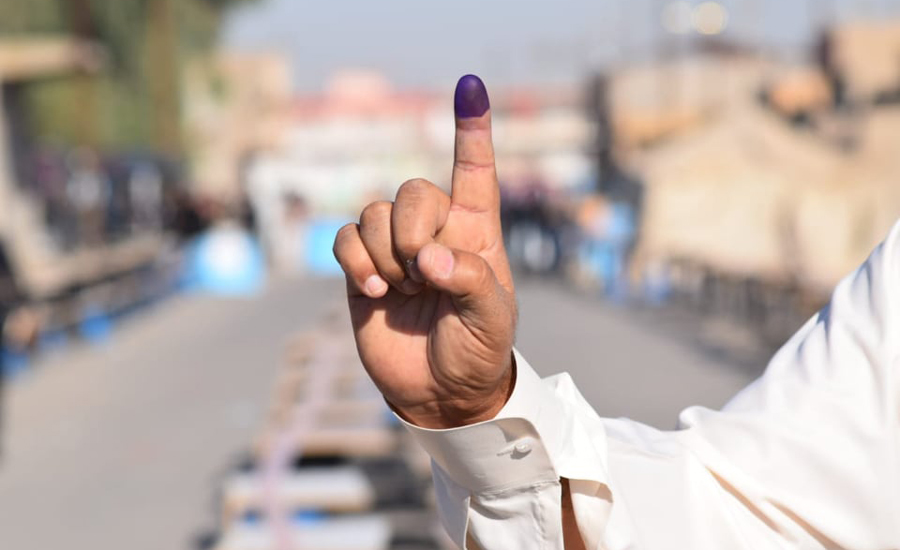Over 23,986,741 eligible Iraqi voters to cast ballots today October 10th in Iraq's early general elections to vote for 3,226 candidates vying for 329 parliamentary seats.
The polling stations opened doors at 7 am throughout the day up to six pm.
It's the first time that the 18 provinces of Iraq have been divided into 83 constituencies, a system followed as a concession to satisfy anti-Iran and anti-corruption protestors of 2019.
The vote was brought forward by six months in response to a popular uprising in the capital Baghdad's Tahrir Square and southern provinces late 2019 when tens of thousands of Iraqis, mainly unemployed young people took to the streets to protest endemic corruption, poor services and rising unemployment.
More than 600 people were killed and thousands injured within just a few months which forced the Prime Minister Adel Abdul-Mahdi to step down.
The new electoral system still keeps nine seats for the ethnic and religious minorities where 5 seats go for the Christian community, and a seat for each of the Ezidis, Shabak, Sabean Mandeans and Faili Kurds.
A jury of judges monitors the process, commissioned by the Independent High Electoral Commission IHEC, the official body that oversees polls.
The spokesperson of IHEC Jumana Ghalai told KirkukNow IDPs can vote only by showing the new biometric cards as old ones were cancelled.
Ghalali added that efforts were mounted to guarantee transparent elections as there are 250 international observers, 500 local and 133 international journalists and hundreds of locals.
Besides, the political parties have registered over 42,000 monitors, she added.
There are over 55,000 polling stations all over Iraq and only 450 voters can cast ballots in a station.
The 2018 elections saw just 44% of eligible voters casting ballots, a record low. The results were widely contested. There are concerns of a similar or even lower turnout this time.
Iraq's top Shiite cleric Grand Ayatollah Ali al-Sistani, has called for a large turnout, saying that voting remains the best way for Iraqis to take part in shaping Iraq's future.
Abdul-Amir al-Shimmari, head of high committee for security of the elections, said in a press, "our troops have made all preparations to secure the polling. Our forces protect the voters and stations in all provinces."
The mission of security is assigned to police under ministry of interior, rapid response units, and Iraqi counter terrorism services CTS.
General elections in the disputed territories
Over one million voters out of 1.6 million residents of the multi-ethnic province of Kirkuk are going to cast ballots to nominate 12 candidates to Iraqi parliament, three of it for women plus a seat for the Christian community.
Out of 130 competitors, only 33 of them are women. Kirkuk is divided into the three electoral districts and 315 ballot stations.
Kirkuk is one of the main disputed areas in addition to Diyalah and Nineveh that a three-stage process outlined in Article 140 of the Iraqi constitution in 2005, stipulating normalization, a population census and a referendum on the status of the territories, was drawn to put an end to Kurdistan region government KRG and Iraqi Federal government dispute over these areas.
The province of Ninewa has 31 seats in the Iraqi parliament, 8 for women and 4 for the minorities. Over 2,330,000 voters choose out of 401 nominees.
140 stations were allocated for registration and update of documents of Ninewa voters and 750 ballot stations in eight constituencies.
About one million eligible voters of Diyala are distributed over four electoral districts to vote for 164 nominees vying for 14 seats, four allocated for women quota.
About 200,00 to 250,000 voters in the fourth electoral district of Diyala province from the mainly Kurdish towns of Khanaqin, Qaratapa, Sadiya, Hamrin, Kifri suburbs and Jalawla, are to vote for 35 candidates.
Over one million voters of Salahaddin province are voting in three electoral districts for 12 seats for which 194 nominees compete, 61 one of them are women.
The district of Duz Khurmatu is the only disputed town of Salahaddin province where 150,000 people choose among 62 candidates.





